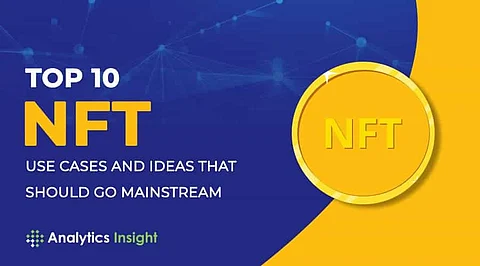

NFTs or non-fungible tokens have become the new attraction in the cryptocurrency and blockchain industry. They are digital tokens of virtual and real-world assets that can be applied to any item. Before NFTs, creating digital scarcity for assets was significantly tougher. Even after facing the growing evolution in technology and as a financial instrument, NFTs continue to offer new means of creating digitized assets, monetizing intellectual property, and verifying the authenticity of the physical assets on the internet. Meanwhile, crypto analysts and experts continue to research more on NFT use cases to learn about their actual potential.
The development of non-fungible tokens has not only brought crypto art and digital collectibles together but has also helped in proving the authenticity of real estate and logistics and other unique and collectible goods. Since NFTs have drawn a lot of attention in the arts, entertainment, and business world, here are some interesting NFT use cases and ideas that should go mainstream.
• Art NFTs: NFTs have a long-standing relationship with digital art. Even if it is fake art in the real-world scenario, NFTs can identify them. Crypto art tends to attain more value if its ownership and authenticity are verified digitally. Sometimes, it becomes more necessary to verify its ownership, rather than the inherent value of the asset. NFTs prove effective for these purposes.
• Gaming: According to experts, there are almost 2 million people who indulge themselves in online gaming activities, every day. The reason why NFT has not witnessed a wider acceptance in this industry is that the development lifecycle of games is longer than digital arts and collectibles. But as more people are choosing blockchain games, the industry is turning to the facilities of NFT.
• Finance NFTs: In Defi, NFTs provide unique financial abilities. Most will have some artwork involved but their value comes from the utility. Through different NFT platforms and models, the users can access token pools, creating secondary markets for these NFTs based on the degree of access they can provide.
• Fashion and Wearables: Luxury brands are now coming to the NFT space. The amalgamation of high fashion and blockchain has started to create a revolution in the fashion industry. The set includes physical assets like retail clothing and other accessories along with their digital companions as NFTs. The merge of technology like NFT and augmented reality with physical couture has unveiled a new line of digital apparel that will soon overtake industry enthusiasts.
• Music NFTs: Like an image file or video, musicians can attach their audio pieces to NFTs and create a collectible piece of music. It would be like the first edition of a digital record. Musicians find it difficult to get a fair share of the royalties. The adoption of their music by larger streaming services might not always be possible. Therefore, this model is set to solve all these issues and the artists will no longer depend on third-party services.
• Logistics: Blockchain technology can be useful for logistics as well mainly because of its immutability and transparency. It ensures that the supply chain data remains authentic and reliable. With essential commodities and perishable goods, it is imperative to know the details related to the goods and for how long will they remain usable. The added benefit to this is NFT's nature to represent unique items.
• Domain Name Ownership: With blockchain domain systems, owners can control their domains using private keys. Blockchain domain NFTs enable easy trading as well as customizable domain names. The ICANN controls the standard domain name service, which raises concerns about censorship and security. Blockchain domain names are recorded permanently in a public registry and cannot be deleted or altered by any third party.
• Real Estate: NFTs have platforms for selling digital real estate in both the virtual and real worlds. Digital real estate applications are gaining momentum in different types of games. Using NFTs to purchase objects and areas ensures that the original owners and producers can be identified.
• Identification and Documentation: NFTs can prove significantly useful when it comes to personal identity management. They contain unique information stored in their tokens. These tokens can be used for documenting degrees, certificates, medical records, and qualifications. The certification can be issued over the blockchain as NFT, which can be traced back to the owner.
• Real-World Assets: Since NFTs can be linked to real-world assets, they can be used to prove ownership. Real estate deal with physical property deeds. These deeds can be transformed into tokenized digital assets that can move physical assets like houses or land into the blockchain network.
Join our WhatsApp Channel to get the latest news, exclusives and videos on WhatsApp
_____________
Disclaimer: Analytics Insight does not provide financial advice or guidance. Also note that the cryptocurrencies mentioned/listed on the website could potentially be scams, i.e. designed to induce you to invest financial resources that may be lost forever and not be recoverable once investments are made. You are responsible for conducting your own research (DYOR) before making any investments. Read more here.
